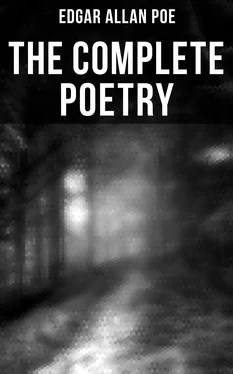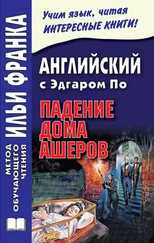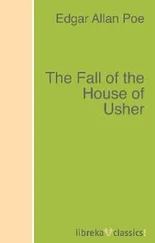Table of Contents
Helen, thy beauty is to me
Like those Nicean barks of yore,
That gently, o'er a perfumed sea,
The weary, wayworn wanderer bore
To his own native shore.
On desperate seas long wont to roam,
Thy hyacinth hair, thy classic face,
Thy Naiad airs have brought me home
To the glory that was Greece,
To the grandeur that was Rome.
Lo! in yon brilliant window niche,
How statue-like I see thee stand,
The agate lamp within thy hand!
Ah, Psyche, from the regions which
Are Holy Land!
Table of Contents
Once it smiled a silent dell Where the people did not dwell; They had gone unto the wars, Trusting to the mild-eyed stars, Nightly, from their azure towers, To keep watch above the flowers, In the midst of which all day The red sun-light lazily lay, Now each visitor shall confess The sad valley's restlessness. Nothing there is motionless— Nothing save the airs that brood Over the magic solitude. Ah, by no wind are stirred those trees That palpitate like the chill seas Around the misty Hebrides! Ah, by no wind those clouds are driven That rustle through the unquiet Heaven Unceasingly, from morn till even, Over the violets there that lie In myriad types of the human eye— Over the lilies that wave And weep above a nameless grave! They wave:—from out their fragrant tops Eternal dews come down in drops. They weep:—from off their delicate stems Perennial tears descend in gems.
Table of Contents
In Heaven a spirit doth dwell
"Whose heart-strings are a lute;"
None sing so wildly well
As the angel Israfel,
And the giddy Stars (so legends tell),
Ceasing their hymns, attend the spell
Of his voice, all mute.
Tottering above
In her highest noon,
The enamoured Moon
Blushes with love,
While, to listen, the red levin
(With the rapid Pleiads, even,
Which were seven),
Pauses in Heaven.
And they say (the starry choir
And the other listening things)
That Israfeli's fire
Is owing to that lyre
By which he sits and sings—
The trembling living wire
Of those unusual strings.
But the skies that angel trod,
Where deep thoughts are a duty—
Where Love's a grow-up God—
Where the Houri glances are
Imbued with all the beauty
Which we worship in a star.
Therefore, thou art not wrong,
Israfeli, who despisest
An unimpassioned song;
To thee the laurels belong,
Best bard, because the wisest!
Merrily live and long!
The ecstasies above
With thy burning measures suit—
Thy grief, thy joy, thy hate, thy love,
With the fervor of thy lute—
Well may the stars be mute!
Yes, Heaven is thine; but this
Is a world of sweets and sours;
Our flowers are merely—flowers,
And the shadow of thy perfect bliss
Is the sunshine of ours.
If I could dwell
Where Israfel
Hath dwelt, and he where I,
He might not sing so wildly well
A mortal melody,
While a bolder note than this might swell
From my lyre within the sky.
1.And the angel Israfel, whose heart-strings are a lute, and who has the sweetest voice of all God's creatures. Koran .
Table of Contents
I heed not that my earthly lot
Hath—little of Earth in it—
That years of love have been forgot
In the hatred of a minute:—
I mourn not that the desolate
Are happier, sweet, than I,
But that you sorrow for my fate Who am a passer-by.
Table of Contents
The bowers whereat, in dreams, I see
The wantonest singing birds,
Are lips—and all thy melody
Of lip-begotten words—
Thine eyes, in Heaven of heart enshrined
Then desolately fall,
O God! on my funereal mind
Like starlight on a pall—
Thy heart— thy heart!—I wake and sigh, And sleep to dream till day Of the truth that gold can never buy— Of the baubles that it may.
Table of Contents
Fair river! in thy bright, clear flow
Of crystal, wandering water,
Thou art an emblem of the glow
Of beauty—the unhidden heart—
The playful maziness of art
In old Alberto's daughter;
But when within thy wave she looks—
Which glistens then, and trembles—
Why, then, the prettiest of brooks
Her worshipper resembles;
For in his heart, as in thy stream,
Her image deeply lies—
His heart which trembles at the beam
Of her soul-searching eyes.
Table of Contents
I saw thee on thy bridal day—
When a burning blush came o'er thee,
Though happiness around thee lay,
The world all love before thee:
And in thine eye a kindling light
(Whatever it might be)
Was all on Earth my aching sight
Of Loveliness could see.
That blush, perhaps, was maiden shame—
As such it well may pass—
Though its glow hath raised a fiercer flame
In the breast of him, alas!
Who saw thee on that bridal day,
When that deep blush would come o'er thee, Though happiness around thee lay, The world all love before thee.
Table of Contents
Thy soul shall find itself alone
'Mid dark thoughts of the gray tombstone
Not one, of all the crowd, to pry
Into thine hour of secrecy.
Be silent in that solitude
Which is not loneliness—for then
The spirits of the dead who stood
In life before thee are again
In death around thee—and their will
Shall overshadow thee: be still.
The night—tho' clear—shall frown—
And the stars shall not look down
From their high thrones in the Heaven,
With light like Hope to mortals given—
But their red orbs, without beam,
To thy weariness shall seem
As a burning and a fever
Which would cling to thee forever.
Now are thoughts thou shalt not banish—
Now are visions ne'er to vanish—
From thy spirit shall they pass
No more—like dew-drops from the grass.
The breeze—the breath of God—is still—
And the mist upon the hill
Shadowy—shadowy—yet unbroken,
Is a symbol and a token—
How it hangs upon the trees,
A mystery of mysteries!
Table of Contents
In visions of the dark night
I have dreamed of joy departed—
But a waking dream of life and light
Hath left me broken-hearted.
Ah! what is not a dream by day
To him whose eyes are cast
On things around him with a ray
Turned back upon the past?
That holy dream—that holy dream,
While all the world were chiding,
Hath cheered me as a lovely beam,
A lonely spirit guiding.
What though that light, thro' storm and night,
So trembled from afar—
What could there be more purely bright
In Truth's day star?
Table of Contents
Romance, who loves to nod and sing,
With drowsy head and folded wing,
Among the green leaves as they shake
Far down within some shadowy lake,
To me a painted paroquet
Hath been—a most familiar bird—
Taught me my alphabet to say—
To lisp my very earliest word
While in the wild wood I did lie,
A child—with a most knowing eye.
Of late, eternal Condor years
Читать дальше












